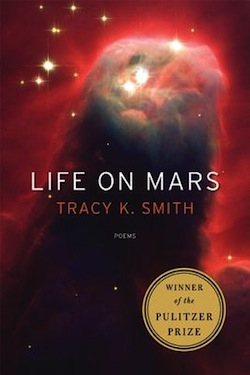If your brain is anything like my brain then the part of your brain reserved for thinking about outer space is a mess. It’s probably cluttered with things like the moon landing footage, pics from Curiosity, clips from
Farscape, the cover of The Little Prince, that Smashing Pumpkins music video, and so on. On top of all that, looking up at a sky full of stars prompts all of the big questions: Why are we here? Why is everything in the
universe moving away from everything else at a constantly increasing pace?
And why won’t astronomers acknowledge Pluto as a planet when I know it’s
one in my heart?
Pulitzer Prize-winning poet Tracy K. Smith doesn’t have answers. She
doesn’t try to reconcile the messes in our heads. In Life on Mars she celebrates our confusing, question-riddled relationship with the universe.
The universe is “brutal and alive,” Smith says. It is dark, but we have given it many faces. Life on Mars begins with youthful big picture questionsthe type about space and time fit for stargazing at midnight with your back to the giant trampoline. In “The Weather in Space” Smith asks, “Is God being or pure force?” In “Don’t You Wonder Sometimes, Part 2” she asserts that “The future isn’t what it used to be and so she guesses at what the new future will be: there will be museums filled with artifacts from today money, honey, oil and extraterrestrials will arrive and be treated politely, if territorially. In “My God, It’s Full of Stars, Part 3,” Smith ponders that, “Perhaps the great error is believing we’re alone,/ That the others have come and gonea momentary blip/ When all along, space might be choc-full of traffic”
These notions come in stanzas slowly populated with famous figures of science and science fiction: Charlton Heston, David Bowie, Dave Bowman, and Larry Niven.
“My God It’s Full of Stars” takes the reader to the set of Kubrick’s 2001. We’re pulled between poems of dark, distant futures and the retro-futuristic worlds of previous generations. And as we accumulate a broader picture of space, Smith turns inward and become increasingly intimate. Other poems focus on her late father, an engineer who worked on the Hubble Telescope. In her grief she finds herself riddled with yet more questions about the state of that that is absent. From “The Speed of Belief”:
What happens when the body goes slack?/ When what anchors us just drifts off toward. . . ./ What that is ours will remain intact?
He is only gone so far as we can tell. Though/ When I try, I see the white cloud of his hair/ In the distance like an eternity.
Smith also writes about the notion of the presence of her own child before conception in “When Your Small Form Tumbled Into Me.”
You must have watched/ For what felt like forever, wanting to be/ What we passed between us like fire./ Wanting weight, desiring desire, dying/ To descend into flesh, fault, the brief ecstasy of being.
As the scale of her preoccupations change from the cosmic to deeply personal, Smith also writes about social phenomena. Two of my favorite poems of the collection were “Solstice” and “They May Love That He Has Chosen and Hate All That He Has Rejected”, both of which deal with American social issues. The former deals with the decay of journalistic integrity, the latter with hate crimes.
“Solstice”, which begins “They’re gassing geese outside JFK./ Tehran will likely fill up soon with blood./ The Times is getting smaller day by day.” expresses Smith’s deep frustration with the state of journalism. In the length of the short poem the reporting on the incident with the geese grows increasingly fearful and absurd. Soon the geese are both terrorists and a plague. Nothing more specific is mentioned about Tehran.
“In Which the Dead Send Postcards to Their Assailants from America’s Most Celebrated Landmarks,” is (as you might expect) a series of short fictional correspondences from the victims of recent, fatal hate crimes addressed to their attackers. The notes are all brief, jovial, and hopeful for the future.
The beautiful and sometimes scary thing about our relationships with intangible forces ( space, God, the dead, farts, whatever) is that we change them with our minds. By guessing at the future or the nature of the dead we create possibilities then reinforce them with our own connection to them.
From the cosmos to the personal, Tracy Smith reminds us of the presence of absent forces. Space is not empty, but rather a host of our projections and ungraspable things.
Ali Fisher is a correspondent for Tor.com and lives in New York.










